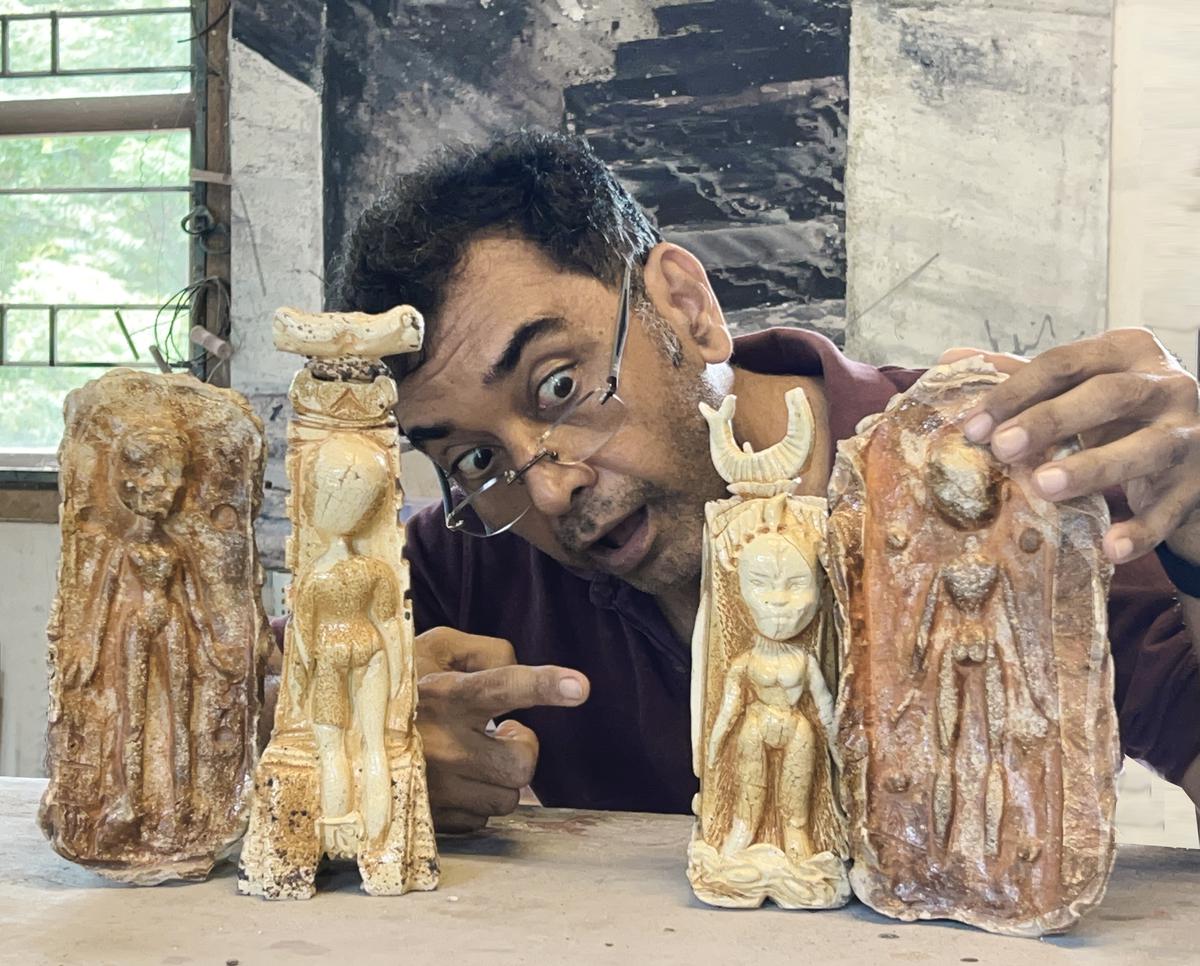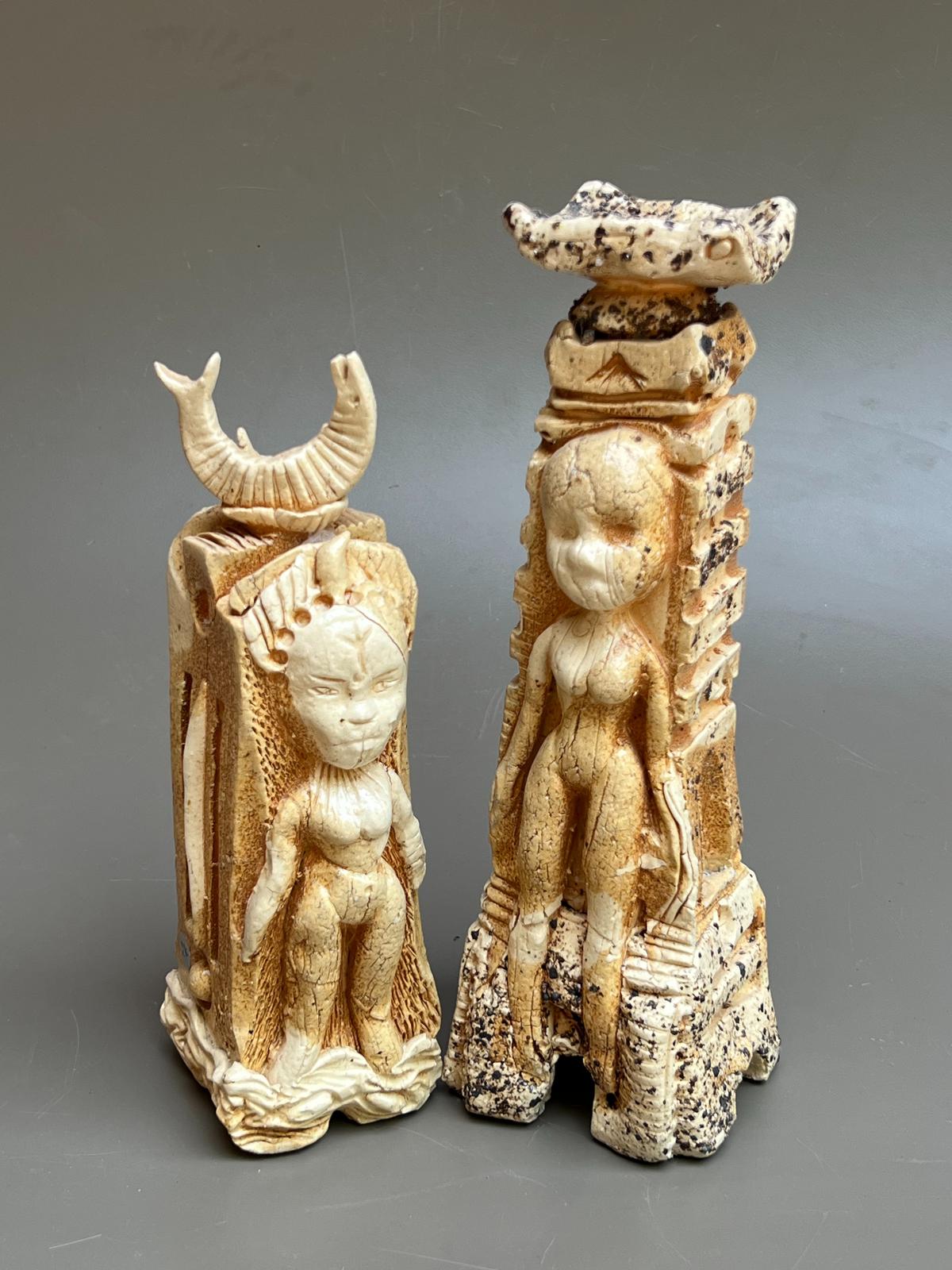Adil Writer’s ‘Family Barbie’ in sodafired stoneware
| Photo Credit: Courtesy Adil Writer
Spain, 2016: It was a Saturday morning when local Spanish friends dragged me to the “largest flea-market of the year” in Barcelona. In a central location of the chaos, I spotted three huge mountains of dolls, specifically Barbie dolls, enough to fill up a basketball court. I asked my potter friend, Alberto Bustos, to tell the seller what I wanted. The man, however, gave me a dirty look and turned away. I asked Alberto what he’d told him. He replied, “I told him this Indian man does not want good quality Barbie dolls. He is going to tear up their clothes, cut off their hair, and do something with them.”
No wonder the man freaked out. So, I requested Alberto to tell him that I am a ceramic artist and want to do such ‘horrors’ only so that I could make plaster of Paris moulds of the dolls to create sculptural figurines in clay. The problem solved, I carried the collection of dismembered dolls to India. (Never mind what my bag looked like in the X-ray machines at the airports!)
The original Barbie dolls prior to making the moulds
| Photo Credit:
Courtesy Adil Writer
Laying bare the skeletal figure
I grew up in Dadar Parsi Colony in the Bombay of yore, in what I now categorise as a Barbie-free zone. I honestly don’t recall any children in my neighbourhood playing with the doll. Which is why I was very surprised to learn that there are so many different versions of Barbie and Ken in the world. This enlightenment came only because of the Barbie movie, which is colouring the world pink these days. The Barbie–Oppenheimer face-off was a no-brainer for me — all that pink couldn’t compete with the story of the bomb — but what it did trigger was why I had made those figurines seven years ago.

Adil Writer with his clay interpretations
| Photo Credit:
Courtesy Adil Writer
When one strips Barbie’s frilly finery and flowing hair away, what is left is a horrific skeletal image — which we pass on to our children as the ideal body shape. ‘Get Real Barbie’ was created by the South Shore Eating Disorders Collaborative in the U.S. to raise awareness regarding body image, the media, and the unrealistic beauty ideas set by pop culture. If Barbie were an actual woman, she would be 5’9”, have a 39” bust, an 18” waist, 33” hips and size 3 shoes, totalling to a body weight of 110 lbs (49.8 kg)!
Let’s not go into the proportions of Ken. Look at the size of his head in comparison to his body; a true pea-brain.
A prototype that needs to be broken
The metamorphosis of Barbie in my ceramic sculptures is not easy to look at. Most people turn away in disgust, unable to accept the truth these images portray; parents shield their kids in my studio. But it was not I who designed the prototype, I’m using a mould made of the very doll they adored in their childhood. Can I help it if Barbie, minus her clothes, is miserably anorexic?

Barbie Sentinels in sodafired stoneware
| Photo Credit:
Courtesy Adil Writer
How many recall the Slumber Party Barbie? Originally launched in 1965, it came with a pink bathroom scale set to 110 lbs and a book titled How to Lose Weight — that offered a terse dieting suggestion, “DON’T EAT!”
In 2017, I was working on Sentinels, a solo show of gateposts at the Cube Gallery in Goa. As a knee-jerk reaction to Barbie’s disproportions, I decided to give her heavier thighs and a breast reduction, all easier done in soft, malleable clay as compared to a plastic surgeon’s scalpel. What emerged was a far more realistic figure than what her designer, Ruth Handler, or the American toy company Mattel could’ve ever imagined. I must revisit this series again. It’s almost a social obligation now that the movie has gone viral.
The writer is an Auroville-based multimedia artist working with clay as his medium of choice.